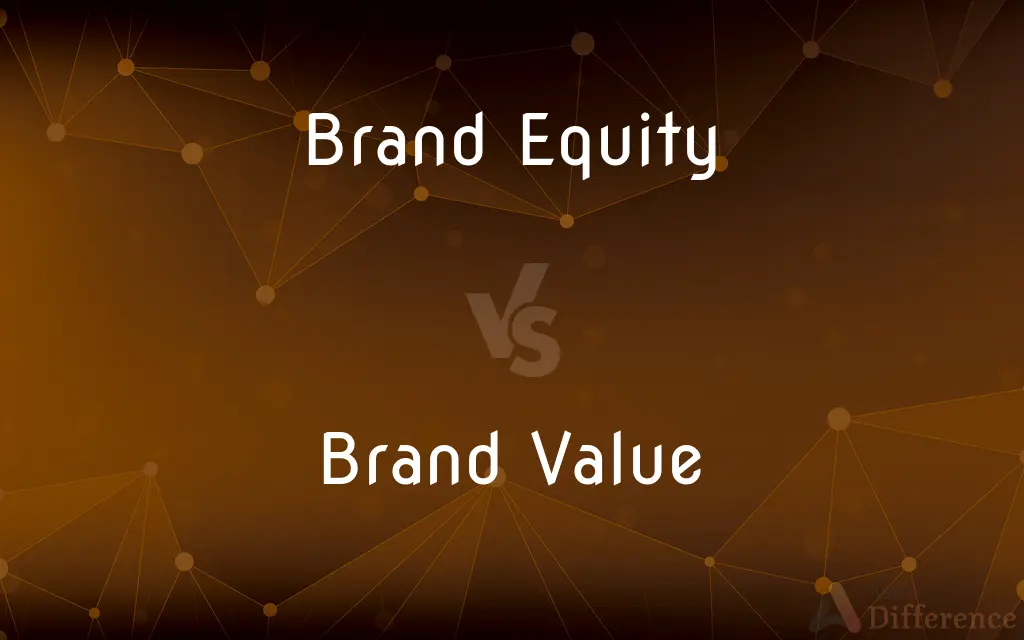Brand Equity vs. Brand Value — What's the Difference?
By Tayyaba Rehman — Published on October 3, 2023
Brand Equity is the perceived value of a brand, built by consumer experiences and associations, while Brand Value is the financial worth attributed to the brand, often calculated based on revenues, profitability, and market share.

Difference Between Brand Equity and Brand Value
Table of Contents
ADVERTISEMENT
Key Differences
Brand Equity refers to the perceived value and strength of a brand in the consumer’s mind, derived from their experiences, perceptions, and associations with the brand. In contrast, Brand Value signifies the financial worth or economic value attributed to the brand, often calculated by its impact on revenues, market share, and profitability.
Brand Equity is built and shaped by consumer experiences, brand associations, awareness, and loyalty. It can influence consumer preferences and purchase decisions, impacting a brand’s market position. Conversely, Brand Value is primarily influenced by the economic principles of demand and supply, future earnings potential, and market conditions, reflecting the brand's economic viability and financial performance.
Brand Equity is inherently qualitative, gauged through brand recognition, reputation, and the perceived quality attributed to the products or services of the brand. Brand Value, however, is quantitative, measurable in monetary terms, often calculated through methodologies like discounted cash flows or revenue multipliers.
While Brand Equity is subjective and can vary based on individual consumer perceptions and experiences, Brand Value is objective, determined by financial analyses and market assessments. Each serves a different purpose, with Brand Equity focusing on consumer-centric aspects and Brand Value concentrating on the economic and financial aspects of the brand.
In essence, while Brand Equity and Brand Value are interconnected, they differ in nature, measurement, and implications. Brand Equity revolves around consumer perceptions and experiences, shaping brand reputation and preference, while Brand Value is the monetary worth ascribed to the brand, reflecting its financial impact and market position.
ADVERTISEMENT
Comparison Chart
Definition
Perceived value and strength of a brand in the consumer’s mind.
Financial worth or economic value attributed to the brand.
Nature
Qualitative, based on consumer experiences and associations.
Quantitative, measured in monetary terms reflecting financial performance.
Influencing Factors
Consumer experiences, brand associations, awareness, and loyalty.
Economic principles, future earnings, market conditions, and financial metrics like revenues.
Measurement
Subjective, influenced by individual perceptions and experiences.
Objective, determined through financial analyses and market assessments.
Focus
Customer-centric aspects like brand recognition, reputation, and perceived quality.
Economic and financial aspects like economic viability and financial worth.
Compare with Definitions
Brand Equity
High Brand Equity can lead to increased market share and profitability through consumer preference and loyalty.
Amazon’s immense Brand Equity has contributed to its dominant market share in e-commerce.
Brand Value
Brand Value is influenced by the brand's impact on revenues, market share, and profitability.
McDonald’s Brand Value is indicated by its extensive global market share and consistent revenues.
Brand Equity
Brand Equity is the perceived strength and value of a brand based on consumer experiences.
Strong Brand Equity allows Apple to command premium prices for its products.
Brand Value
Brand Value is calculated based on objective financial analyses and market assessments.
The calculated Brand Value of Samsung incorporates its market position, revenues, and future earnings potential.
Brand Equity
Brand Equity is a qualitative measure of a brand's reputation and consumer preference.
The Brand Equity of Tesla is significantly enhanced by its reputation for innovation and quality.
Brand Value
Brand Value is a representation of the economic and financial impact of a brand.
The rising Brand Value of Spotify is indicative of its growing user base and market influence.
Brand Equity
Brand Equity reflects the consumer's perceptions, preferences, and loyalty towards a brand.
Nike’s positive Brand Equity is reflected in its loyal customer base and strong brand recognition.
Brand Value
Brand Value is the financial worth attributed to a brand, measurable in monetary terms.
The Brand Value of Google is immense, reflecting its dominant market position and high profitability.
Brand Equity
Brand Equity is influenced by brand awareness, associations, and the perceived quality of products or services.
Coca-Cola's extensive Brand Equity is built on high brand awareness and positive associations with refreshment.
Brand Value
Brand Value reflects the economic viability and financial performance of a brand in the market.
Microsoft’s high Brand Value is a result of its sustained financial performance and innovation.
Common Curiosities
How is Brand Equity built?
Brand Equity is built by positive consumer experiences, strong brand associations, high brand awareness, and consumer loyalty.
How is Brand Value defined?
Brand Value is the financial worth or economic value attributed to a brand, calculated based on its financial impact and market position.
How is Brand Value measured?
Brand Value is measured in monetary terms, often calculated through methodologies like discounted cash flows or revenue multipliers.
Can Brand Equity enhance a brand’s market position?
Absolutely, positive Brand Equity can strengthen a brand’s market position by influencing consumer preference and loyalty.
Is Brand Equity qualitative or quantitative?
Brand Equity is qualitative, based on subjective consumer experiences and perceptions of the brand.
What is Brand Equity?
Brand Equity is the perceived value and strength of a brand based on consumer experiences, perceptions, and associations.
Does Brand Equity influence consumer purchase decisions?
Yes, strong Brand Equity can significantly influence consumer preferences and purchase decisions.
Can Brand Value reflect a brand’s financial performance?
Yes, Brand Value is a reflection of a brand’s financial performance, including its impact on revenues, market share, and profitability.
How does Brand Value relate to a brand’s economic viability?
Brand Value directly relates to economic viability, reflecting the economic and financial worth of the brand in the market.
Can strong Brand Equity lead to higher profits?
Yes, strong Brand Equity can lead to consumer preference and loyalty, potentially resulting in increased market share and higher profits.
How does Brand Equity affect brand reputation?
Brand Equity directly affects brand reputation as it is shaped by consumer perceptions, experiences, and associations with the brand.
Is Brand Value objective or subjective?
Brand Value is objective, determined by financial analyses and assessments of the brand's market position and economic impact.
Can high Brand Value indicate market dominance?
Indeed, high Brand Value can indicate a brand’s market dominance, reflecting its superior market position and financial performance.
Is Brand Value influenced by market conditions?
Yes, Brand Value is influenced by market conditions, demand and supply, and future earnings potential.
Share Your Discovery

Previous Comparison
Heavy Cream vs. Thickened Cream
Next Comparison
Motivation vs. DisciplineAuthor Spotlight
Written by
Tayyaba RehmanTayyaba Rehman is a distinguished writer, currently serving as a primary contributor to askdifference.com. As a researcher in semantics and etymology, Tayyaba's passion for the complexity of languages and their distinctions has found a perfect home on the platform. Tayyaba delves into the intricacies of language, distinguishing between commonly confused words and phrases, thereby providing clarity for readers worldwide.
















































